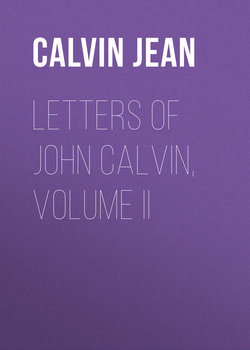Читать книгу Letters of John Calvin, Volume II - Calvin Jean, Jean Calvin - Страница 22
CLXV. – To Farel and Viret. 61
ОглавлениеRequests in favour of the faithful in France
Geneva, 1st May 1546.
This pious brother is a citizen of Uzés,62 a place where many have been utterly ruined by the severity of the ungodly. They have all agreed to try whether any succour is to be found among the Germans. I replied, that I had somewhat greater hope to-day, in that our princes have shewn, by clear indications, their aversion from imprisoning. I had, besides, been reminded that there was a certain person at Worms, sent by the Dauphin, who makes many promises. I am, indeed, aware of the hollowness of courts, but there will be no harm in making trial. I should not have refused what they strenuously insisted upon, viz., that I should undertake this journey, were I not still a prisoner, so slow is the process of my convalescence. I hardly know what progress I have hitherto made towards recovery, unless that my sufferings are allayed.63 I have, therefore, left this duty to one of you. Whoever of you finds it convenient will provide the expenses. As you, Viret,64 are on the eve of setting out for Berne, it is right that our friend Farel be relieved by you of this burden, if the Senate give its permission. But if you shall not be free to go, Farel himself, I know, will spare neither himself nor his age; certainly otherwise he will be absolutely indispensable. Wherefore, if leave of absence be denied to Viret, take care you do not fail, Farel, for I have almost given a pledge in your name to the brethren. It remains with you, therefore, to fulfil the pledge, even though it were given rashly. Moreover, because, from the present state of the kingdom, it would be in vain to ask of the King what he ought to do of his own accord, we have judged that he must at least be required to undertake the commission of inquiry. This, again, will be equivalent to interdicting the Parliaments from engaging in it. In the next place, he must be asked to nominate extraordinary impartial judges. If this is obtained, a great step will be made. To aim at anything beyond this would, as I said, be superfluous. If the Chancellor is disposed to favour us, all will be well.65 But as he is timid and tardy, we must see to it that he is vigorously urged on. Accordingly, not less pains must be taken in these secondary matters than in those of prime importance. But abjuration is always to be expressly excluded; for we do the work of Satan, if we open up a path to the godly whereby they may be permitted to abjure Christ. I diligently commend the whole matter, first to Master James Sturm, whose authority in the conventions is of the highest order; in the next place to Bucer, that he may stimulate those whom he can; again to Sturm and Dr. Ulrich, that they may also interpose the weight of their personal influence. The affair itself will give you counsel. You are not, however, tyros. May the Lord prosper his journey who shall undertake this sacred cause. – Yours,
John Calvin.
[Lat. orig. autogr. – Library of Geneva. Vol. 106.]
62
Is this Uzés a small town of Languedoc, now comprised in the department of Gard? Beza and the historian of the martyrs furnish us with no information on this point.
63
Desirous of rendering assistance to Calvin during his illness and recovery, the Seigneurs of Geneva decided upon allowing him an attendant at the public expense. – Registers of Council, 4th March 1546.
64
Viret was on the point of repairing to Berne, in order to discuss certain matters relative to the ordinances of the Reformation in the Pays de Vaud. – Ruchat, vol. v. p. 298.
65
After the disgrace of the Chancellor Poyet, this high office was filled by François Olivier, Seigneur of Louville, President of the Parliament of Paris. He resigned in 1550, and again became Chancellor in 1559, in order to give his sanction to the lamentable executions of Amboise, which he survived only for a short time.
